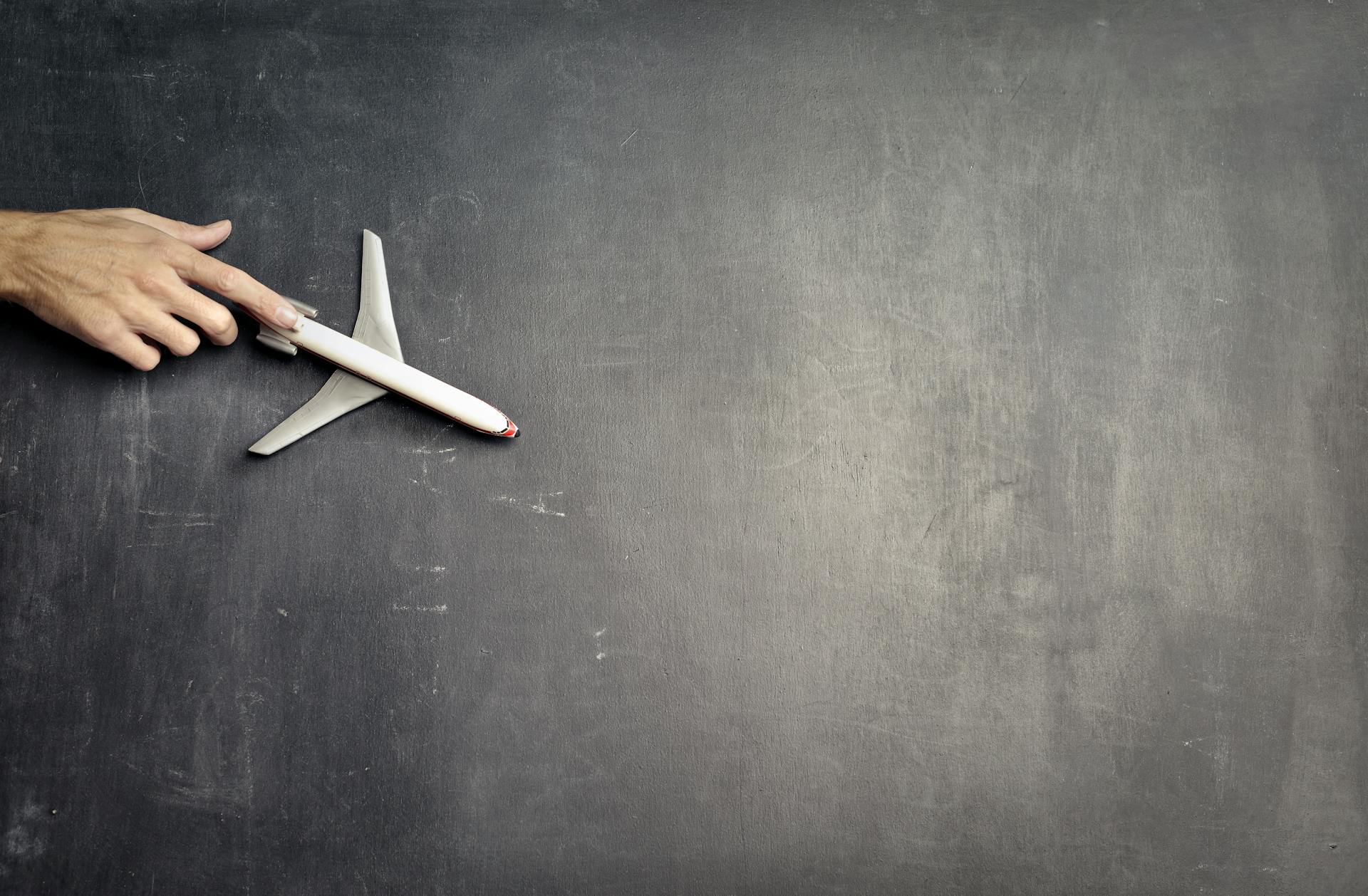
Are you one of the millions of people who experience flight anxiety or fear of flying? If so, fear not! In this article, we'll share some practical fear of flying tips to help you finally overcome your fears and enjoy air travel once again.
Perhaps your fear of flying started months ago after a particularly turbulent flight or even a panic attack mid-flight. Maybe you were formally diagnosed with flight anxiety after experiencing moments of intense dread accompanied by physical symptoms such as sweaty palms, extreme nausea, and trouble breathing. Or maybe it's been a lifelong struggle that began in grammar school when you first stepped aboard an airplane. Whatever the case may be, know that you're not alone.
As someone with experience treating people for flight anxiety, I understand how overwhelming it can be to face your fears head-on. However, I've also seen firsthand how effective these fear of flying tips can be in helping individuals conquer their flight anxiety and regain control over their travel experiences. So let's dive in!
Discovering the Root of Your Fear of Flying
If you've experienced flight anxiety or panic attacks while on a plane, you're not alone. One common reason for this fear is due to panic disorder, which is defined by the National Institute of Mental Health (NIMH) as "having repeated and unexpected panic attacks, along with an overwhelming fear of experiencing another episode." The fifth edition DSM-5 Panic Attacks describe that symptoms can include trembling, feeling like your chest hurts or tightens with pain, and an intense fear that can have a swift onset without any obvious trigger.
Panic disorder is just one of many mental disorders that could cause flight anxiety. Other psychological symptoms include experiencing debilitating worry before and during the entire flight, avoiding flying altogether, and having a panic attack in places such as a grocery store or in a cramped airplane. In these instances, it's important to understand what triggers the fear and work towards addressing it.
To discover the root of your fear of flying, you'd theoretically need to explore your past experiences with flying or even general anxieties you may have had growing up. Understanding this information may help alleviate some fears related to air travel. However, if you experience repeated panic attacks while flying, it's best to seek professional help from a therapist who specializes in treating anxiety disorders. Remember: facing your fears is never easy but taking steps towards overcoming them will ultimately lead to growth and relief from anxiety-related symptoms.
Overcoming Anxiety Disorder Triggered by Fear of Flying
Fear of flying is a specific phobia that involves an intense fear of air travel. According to the Mayo Clinic, flight phobia symptoms may include things like feeling panicked, avoiding flying altogether, and experiencing physical reactions such as sweating, trembling or heart palpitations. However, it's important to remember that despite these psychological and physical reactions, the actual risk involved in air travel is relatively low.
For those who suffer from flight phobia or other specific phobias associated with common anxiety disorders, the mere thought of getting on a plane can be overwhelming. But overcoming this fear begins with understanding that it involves long-lasting life-disrupting physical and psychological reactions that can be managed through cognitive-behavioral therapy or medication.
To alleviate some of the stress associated with air travel, start by focusing on relaxation techniques such as deep breathing exercises or visualization techniques. Additionally, consider engaging in exposure therapy – gradually facing your fears by taking small steps to get closer to your goal of flying without feeling panicked. Remember: while fear of flying may feel overwhelming at first, there are plenty of resources available to help you overcome this hurdle and experience the joy of travel without inhibition.
Why it's Important to Consult a Medical Professional

People deal with various fears and anxieties on a daily basis. However, when it comes to flight fear, the experience can be overwhelming and feel unmanageable. Mental health is a serious concern, as 40 million American adults deal with anxiety disorders. That's why seeking help from medical professional professionals is crucial.
Identifying what's causing your flight fear is the first step towards finding effective ways to manage it. A medical professional can evaluate your situation and provide you with the appropriate treatment to help alleviate your symptoms. Seeking help early on ensures that you're taking care of both your mental and physical well-being, which can have lasting benefits for years to come. Don't suffer in silence - consult a medical professional if you're struggling with flight fear.
Discovering Aviation: How It Can Calm Your Fear of Flying

Understanding how planes work can be an effective way to calm your fear of flying. By learning about the mechanics behind it, you can ease the anxiety that comes with being inside a plane. Fly program participants learn aviation facts that help them appreciate the science and technology that goes into every flight, allowing them to see it in a different light.
Catastrophic thinking is a common thought process among those who have a fear of flying. While it’s normal to feel nervous before flying, severe fear or actual phobia can hinder your ability to travel. By conducting aviation research and educating yourself about planes and flying, you will be able to better manage your thoughts and emotions.
Flying may seem like a scary thing at first but once you understand what goes on during every flight, it becomes an exciting opportunity for adventure and exploration. With this newfound knowledge, you’ll be able to experience the seifs freedom that comes with traveling by air without letting your fears hold you back. So go ahead and discover aviation – it might just change your life!
Cognitive behavioral therapy (CBT) is one of the most common therapeutic approaches for fear of flying.
CBT is a therapeutic approach that helps people learn coping skills to manage their fears. According to Psychology Today, CBT practitioners specialize in anxiety, phobias, and panic attacks. Fear of flying is one of the most common fears people experience, known as aviophobia, aerophobia or flight anxiety. CBT works by helping individuals identify and challenge negative thoughts associated with flying.
One CBT technique for overcoming flight anxiety involves exposing oneself to their fear through virtual reality (VR) or in-person exposure. Exposure therapy aims to help patients face their fears gradually while learning how to cope with the physiological symptoms of anxiety, such as increased heart rate and breathing difficulties. Response prevention (ERP) also plays a role in this process by teaching patients techniques like deep breathing or jumping jacks to help reduce physiological signals of anxiety.
A psychological assessment is often conducted prior to any flying therapy sessions. This is important because it allows the therapist to understand the person's specific fears and triggers when it comes to flying. This information can then be used to develop an individualized treatment plan that will help the patient overcome their fear of flying. It may involve anti-anxiety medication, but ultimately the goal is for an anxiety-free flight so that patients can enjoy air travel without experiencing panic attacks or horrible jet lag because they were too anxious during the trip.
Understanding the Root of Your Fear of Flying
If you find yourself feeling anxious or experiencing panic attacks while on a plane, you may have aviphobia – a fear of flying. This common anxiety trigger can be caused by a number of factors, such as a traumatic flight incident or even just being in a tight crowded space. However, the most common influencer is a bad flight experience.
A single direct influence that can trigger aviphobia is a bad flight experience. This could be anything from turbulence to delayed flights or even lost luggage. These negative experiences can create lasting impressions and develop into long-term fears that are difficult to shake off. Additionally, witnessing an aviation event or hearing about one on the news can also contribute to this fear.
It's important to identify the root cause of your fear so you can begin taking steps towards overcoming it. One way to do this is by seeking therapy or counseling to help work through any traumatic experiences that may be contributing to your fear of flying. You can also try practicing relaxation techniques like deep breathing or meditation during flights to help ease anxiety and create positive associations with air travel. Remember, understanding the root of your fear is the first step towards conquering it and enjoying stress-free travel.
Frequently Asked Questions
How I got over my fear of flying?
One effective way to overcome the fear of flying is by seeking professional help through therapy, counseling, or even online programs. Additionally, practicing relaxation techniques, educating oneself about the safety of flying, and gradually exposing oneself to flight experiences can also be helpful.
Do airplanes cause anxiety?
Yes, airplanes can cause anxiety in some people due to fear of flying or other related factors. However, there are various coping strategies and treatments available to help manage this anxiety.
How do I overcome my fear of flying?
One way to overcome your fear of flying is to educate yourself about the safety of air travel and seek professional help through therapy or medication. Additionally, practicing relaxation techniques such as deep breathing and mindfulness can also be helpful in managing anxiety during flights.
How can I Manage my fear of flying?
You can manage your fear of flying by understanding how airplanes work, learning relaxation techniques, and seeking professional help if necessary.
What is a flying phobia?
A flying phobia is an extreme fear of flying that can cause panic attacks, physical symptoms such as sweating and trembling, and avoidance of air travel. It affects millions of people worldwide and can be treated with therapy or medication.
Featured Images: pexels.com


